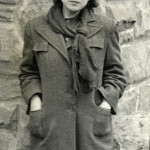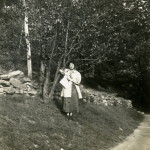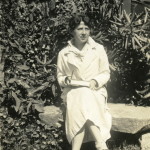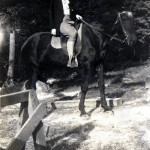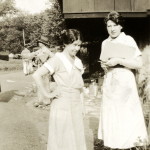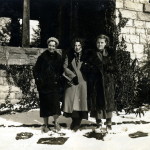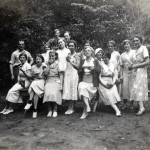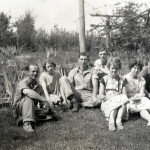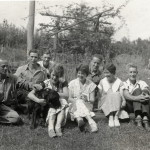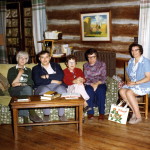Pine Mountain Settlement School
Series 09: BIOGRAPHY – Board
Alice Cobb, Secretary, Teacher 1932-1952; Fundraiser, Trustee
Dr. Alice Lucy Cobb (1909 -1995)
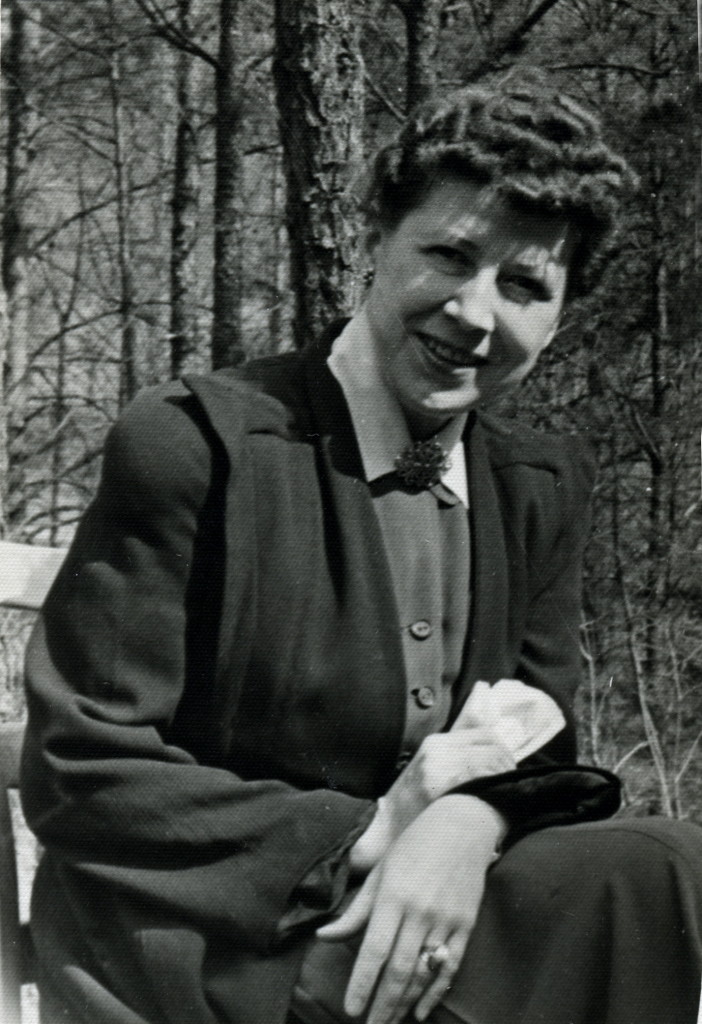
Alice Cobb, PMSS Worker, 1932-1952, and Trustee in the 1980s. [X_100_workers_2578_mod.jpg]
TAGS: Alice Cobb, writers, teachers, publicists, visitors, fundraisers, children’s authors, theologists, Mary Rogers, Scarritt College, Alice Culler Cobb, missionaries, settlement schools, writings by Alice Cobb, Highlander Folk School, American Missionary of the Foreign Board, Methodist Episcopal Church, Alice Cobb Bible School, WWII, Southern Appalachian schools, War’s Unconquered Children Speak
ALICE COBB Staff Board
Secretary, Publicity 1932-1937
Teacher 1942-1952
Volunteer, December 1975
Member, Board of Trustees 1983-?
Fundraiser, Visitor, Consultant 1936-1995
ALICE COBB Staff Board: Pine Mountain
For many years Alice Cobb was an important member of the Pine Mountain Settlement School (PMSS) staff. She came to work at the School in 1932 as a secretary, then served as teacher and publicist for the next 20 years. In later years, she continued to come as a visitor, sometimes fundraiser, and consultant to the campus until her death in 1995. Pine Mountain, no doubt, made important contributions to the interests and talents of Alice Cobb, as well. The influences of Pine Mountain can be seen and felt throughout her life’s work.
She was an accomplished writer and a prolific writer. Not always published, her observations are extensive, amusing, intense, and engaging reading. Her narrative reports and analysis of work at Pine Mountain was probably her most valuable contributions, though, for some readers the reports are also problematic. She filtered through her own perspective and often this perspective was not in line with current opinion or could be read as overly critical. But, critique she did, and today her keen observations are refreshing and candid and possibly some of the most honest observations we have of life at Pine Mountain Settlement School and related surrounding communities in the late 1930s and 1940s. She was well-known in the Pine Mountain community and her blunt style was a remarkably good fit with the direct and honest observations of many valley families. Sometimes she was much like one of the community members she once described as “having a tongue tied in the middle and wagging at both ends.” However, it was not her tongue that wagged, but her pen that could be just as loquacious. Insecure, opinionated, but indomitable in spirit, her observations were driven by an ever-questioning mind that was more sharply analytical than most women of her time would have ventured. She worked with folklorist Richard Chase and for a time with Myles Horton at Highlander Folk School. During the decades of her life she was a model of independence and a palpable force for good.
Several PMSS directors relied on her keen eye and ear and her ability to do comparative social analysis in a variety of settings. She provided not only the Pine Mountain administration but many others her perceptive opinions and sharp critiques of the local rural community. Also, her acerbic view of the narrow perspective of many urban dwellers and communities was the source for much of the Schools fundraising efforts. And, of opinions regarding rural and urban, she had many.
Alice Cobb was a woman of many talents and many interests. Her association with children’s authors, particularly May Justus and Sophia Blanche Lyon Fahs, Unitarian theologian and graduate of Union Theological School, were of particular influence on her interests and later life. She was deeply steeped in the theology of Reinhold Niebuhr. She was a life-long friend of Mary Rogers, wife of former PMSS Director, Burton Rogers, with whom she found many common interests. She had a continuing focus on the education of children and in the power of the spiritual to lend moral strength to literature in the education process. This deep native spirituality runs throughout most of her writing.
ALICE COBB: Return to Pine Mountain
The April 1976 issue of “Notes from the Pine Mountain Settlement School,” the School’s publication sent regularly to friends and donors, featured a reprint of a letter from Alice Cobb. In her letter, she describes her observations of the School when she rejoined the staff for the December 1975 term as a volunteer. She tells of her delight in meeting with old friends and former co-workers, the changes she sees as she moves about the campus, and memories of her earlier time at the School.
GALLERY: ALICE COBB Staff Board
- Alice Cobb, PMSS Worker. [X_099_workers_2499_mod.jpg]
- Alice Cobb, 1934. [X_099_workers_2499a_mod.jpg]
- Alice Cobb. [X_100_workers_2582_mod.jpg]
- Alice Cobb on horse. [X_100_workers_2562b_mod.jpg]
- Mrs. Baird and Miss Cobb standing at north end of Girl’s Industrial Building, c. 1930s. [X_100_workers_2563_mod.jpg]
- Oradelle Malan, Alice Cobb, and “Barbie” [Barbara] Faulkner, standing in the snow. [X_100_workers_2562c_mod.jpg]
- 1931 group portrait. (Back): Peder Mueller, Marian Kingman, Glyn Morris, (?), (?). (Others): Miss Ross, Miss Hall, Miss Wallace, Alice Cobb, Miss Falconer, Oradelle Malan, Lexine Baird. [X_100_workers_2549_mod.jpg]
- Summer 1934. (l. to r.) Oscar Kneller, Miss Lewis, Ben Turner, Tom Madon, Mrs. Faulkner, Miss Alice Cobb, Mr. Sam Winfrey, Mrs. Baird, Mr. Burns. [X_100_workers_2569d_mod.jpg]
- Summer 1934. (l. to r.) Oscar Kneller, Ben Turner, Tom Maden, Mrs. Faulkner, Miss Alice Cobb, Mr. Winfrey, [?], Baird Howard. [X_100_workers_2545.jpg]
- (Left to right) Mary Rogers, Bill Leach, Alice Cobb, (?), and Milly Mahoney in living room of Big Log, c. 1970s. [X_100_workers_2657_mod.jpg]
ALICE COBB: After Pine Mountain
After leaving Pine Mountain’s employment, Alice Cobb became a staff member at Scarritt College in Nashville, Tennessee, where she taught sociology for most of her remaining career. She also worked for a brief time with Myles Horton at the Highlander Folk Center in New Market, Tennessee, and her contributions to various workshops at the Center are recorded in the archive at Highlander Center. Her later work at the Center is very interesting, and when placed within the context of her first impressions of Myles Horton in her 1944 trip to the Highlander Center. Her observations of Horton and Highlander provide a unique perspective on Horton and his institution.
ALICE COBB: Her Mother, Alice Culler Cobb
Alice came from a strong family especially her mother, Alice Culler Cobb [Mrs. J.B. Cobb], who was a missionary for the American Missionary movement of the Methodist Episcopal Church. Mrs. Cobb was, for a number of years, Associate Secretary in the Woman’s Foreign Board, and was elected Corresponding Secretary of the Woman’s Missionary Council, Foreign Department. She also served as a missionary in Nanziang and Kading, Korea, in the first part of the 1900s, an appointment that was particularly strenuous for missionaries of the day. A new industrial school, established c. 1917 for women and girls in Korea, is described in the annals of the Woman’s Missionary Council:
The newly organized school ran only a few months, however, and was closed on account of the revolution. Concerning the future, Miss Howell [Council leader] says: “There is a very great field for industrial education in Korea, and this institution needs special care. The greatest need, and an immediate one, is a missionary trained along textile lines. Such a one must be found and trained if necessary.”
In Georgia, Alice Cobb’s mother founded the Alice Cobb Bible School, and a building designed with Korean influences was named in her honor by the South Georgia Conference. It is located in the same compound with the Lucy Cuninggim building in the South Georgia Conference Alice Cobb Bible School enclave. And, yes, it offered weaving as part of the program. Alice Cobb, her daughter, kept many of her mother’s interests, particularly that of Bible literacy, education of the young, and interest in the Southern Appalachians, and its crafts, particularly weaving. And, it is evident that she also inherited her mother’s strong will toward service.
Her mother had an early interest in Appalachia and the following account finds her in Asheville, North Carolina, for the annual meeting of the American Missionary Foreign Board:
The officers and executive committees of the two woman’s boards met at Asheville before the adjournment of the General Conference. Miss Belle H. Bennett, whose heart and life had for years been in the work of foreign missions and who had from the beginning been the great leader of the home mission forces, was unanimously and without question elected as president of this new united woman’s work. Mrs. J. B. Cobb, who had been for a number of years Associate Secretary in the Woman’s Foreign Board, was elected Corresponding Secretary of the Woman’s Missionary Council, Foreign Department; …
Alice Cobb, daughter of this strong missionary, was among like-minded women at Pine Mountain. Many had come from missionary backgrounds of various denominations, or from homes dominated by strong and forward-thinking women who were early participants in the settlement movement of the urban Northeast and Midwest.
ALICE COBB: Her Writings
Alice Cobb’s Report to Trustee Dorothy Elsmith of her visit to several Mountain institutions in 1944 captures not only surrounding settlement institutions and other social service agencies but also reflects on Pine Mountain’s attempts to bring its work at the School into focus. It discusses the current operating environment at the School, but also reveals for Board of Trustees member, Dorothy Elsmith, the working environment at Pine Mountain after the departure of Glyn Morris, Pine Mountain’s director who left in 1942 to serve as a chaplain in WWII. Cobb’s trip to the various institutions serves as a window on the administration and practices of various settlement schools, folk schools, and mission schools in a three-state area in 1944. Her journal written during the war years, is an account that captures how those institutions were coping with the war and their challenges of running institutions similar to Pine Mountain during a period of privation and difficult management.
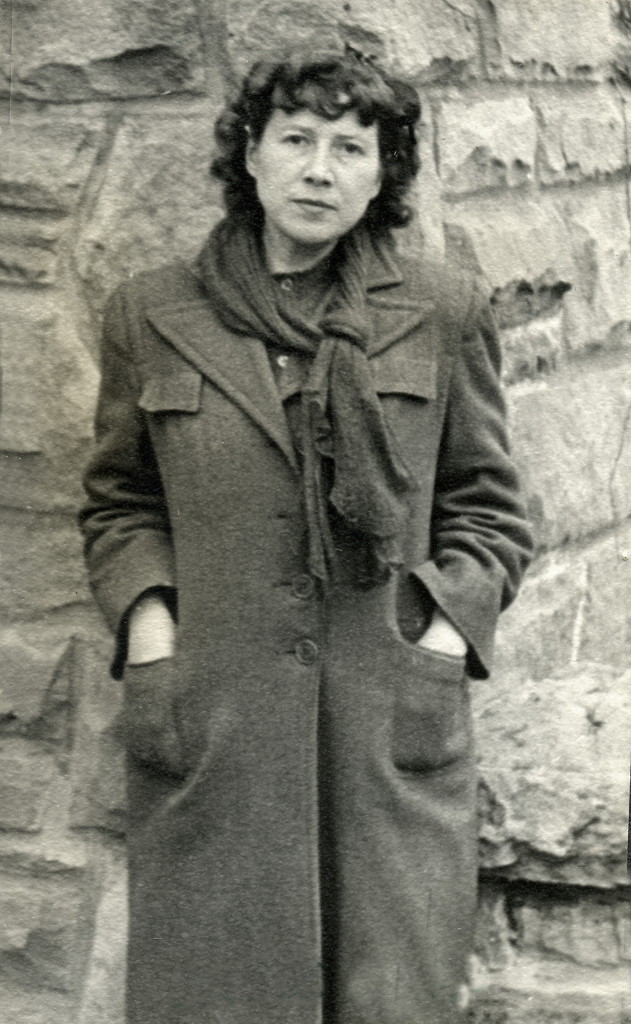
Alice Cobb, PMSS Worker. [X_099_workers_2499_mod.jpg]
The institutions visited included schools that were seen to be similar in mission to Pine Mountain Settlement School. They were: John C. Campbell Folk School ; Cherokee Indian School in the Qualla Boundary, Indian Territory in western North Carolina ; Highlander Folk School, at New Market, Tennessee ; Pleasant Hill Academy at Pleasant Hill, Tennessee ; Warren Wilson Farm School at Swannanoa, NC ; and the Pi Beta Phi School at Gatlinburg, Tennessee. She also made later visits to Black Mountain College and again to the Farm School at Warren Wilson. She visited with Pine Mountain connections in various states, including visits with Luigi Zande and his new family in Asheville, and with Miss Ruth Gaines, former worker at PMSS while she was briefly at Brasstown, North Carolina.
Most all the individuals in these reports are now deceased. However, some few may still be living. We would appreciate being notified of any concerns raised by the sharing of the intimate portraits Alice often drew from her close observations of the schools and personnel mentioned in her journals and her writing.
**********
Dr. Alice Lucy Cobb, was born in Seymour, Indiana, on April 7, 1909. Her parents were John J. Cobb and Ella O. (Steinning) Cobb. She had two older siblings, Henry Elkanah Cobb (b. 1889) and Agnes Junia Cobb (b. 1891).
She received an A.B. from Western College in 1930 and an A.M. from Union Theological Seminary, New York, NY, in 1938.
Peter Rogers, son of Burton Rogers, PMSS teacher and director, 1942-1973, and Mary Rogers, recalls that “Decades ago, she gave me a copy of her latest book, “The Swimming Pool.” We once visited her at her retreat house near Hendersonville, NC, which was built over a cascading stream. I believe she called it “‘Falling Waters.'”
Alice Cobb died in Pleasant Hill, Tennessee, on May 18, 1995.
**********
[Other selected documents, correspondence, writing, and administrative papers of Alice Cobb, while secretary to Glyn Morris at Pine Mountain Settlement School, continue to be added. They are equally descriptive and shed considerable light on the relationship of Pine Mountain to its communities of interest. See especially the ALICE COBB Addenda, a body of recently (2016 and 2017) donated material.]
Recently published and of considerable interest to those concerned with the wave of immigration sweeping across the world, is Cobb’s book first published in 1953 and recently re-published:
WAR’S UNCONQUERED CHILDREN SPEAK (1953)
IS REPUBLISHED
A book by Pine Mountain staff member, Alice Cobb, is as timely today as it was in 1953, following WWII. Recently re-published by Cobb’s long-time friend and publisher, Mary Catherine Nelson, War’s Unconquered Children Speak, chronicles a four-month journey made by Cobb in the Middle East and Europe where she met and interviewed children of war. In this new edition of the original 1953 book by Beacon Press, now out of print and rare, Nelson has added a preface by a displaced Syrian teenager. Hiba’s [a pseudonym] account of her ordeal in the Syrian city of Aleppo, including the loss of both parents and a sister, only underscores the terrible toll war takes on children and their families as recorded earlier by Cobb. Sophia Fahs, who wrote the introduction to the first 1953 edition asks us all to consider the plight of children in war. This book is for anyone “… willing to listen when the children of war themselves speak.”
The book is available on demand from Ideas Into Books at Westview Press or Amazon.
See Also:
ALICE COBB Addenda – Recently (2016 and 2017) donated material
ALICE COBB Correspondence 1940s
ALICE COBB Reference and Correspondence 1930s
ALICE COBB GUIDE TO Writings, Collected Stories
ALICE COBB STORIES “About Sarah Bailey” 1940
ALICE COBB STORIES “Hike to Napiers and Gabe’s Branch”
ALICE COBB STORIES “Trip to Turkey Fork and Big Laurel”
ALICE COBB STORIES “The Big Log Little Girls”
ALICE COBB STORIES “Miss Pettit Stories”
AND MORE ……
ALICE COBB – TRAVELOGUE 1941
ALICE COBB – TRAVELOGUE 1942
ALICE COBB – TRAVELOGUE 1944 for Trustee Dorothy Elsmith
ALICE COBB – TRAVELOGUE 1946
ALICE COBB “Snaps” Photo Album
ALICE COBB “War’s Unconquered Children Speak” – BOOK
COMMUNITY Fair Day 1935 – Narrative by Alice Cobb
GLYN MORRIS Letter To Alice Cobb 1976
NOTES – 1976, pages 1-3. This issue of “Notes from the Pine Mountain Settlement School” features a reprint of Cobb’s letter to the School, describing her observations when she rejoined the staff for the December 1975 term as a volunteer.
COBB, ALICE. Sect Religion and Social Change in an Isolated Rural Community of Southern Appalachia: [with] Case Story : Fruit of the Land, 1965. [Thesis/dissertation]
See below for additional titles by ALICE COBB.
| SERIES 09 – PINE MOUNTAIN SETTLEMENT SCHOOL | |
Alice Cobbd. May 18, 1995
|
|
| Title | Alice Cobb |
| Alt. Title | Dr. Alice Cobb ; Alice L. Cobb ; Alice Lucy Cobb ; Alice Cobb, PhD ; |
| Identifier | Permalink: https://pinemountainsettlement.net/?page_id=6228 |
| Creator | Alice Cobb at Pine Mountain Settlement School |
| Alt. Creator | Ann Angel Eberhardt ; Helen Hayes Wykle |
| Subject Keyword | Alice Cobb ; Dr. Alice Cobb ; Alice L. Cobb, Ph.D ; Burton Rogers ; Pine Mountain Settlement School ; education ; Appalachian music ; Appalachian dance ; Progressives ; Pleasant Hill Academy, Tennessee ; John C. Campbell Folk School, Brasstown, NC ; Highlander Folk School ; Warren Wilson College ; Cherokee Indians ; Pi Phi Sorority ; Gatlinburg, NC ; crafts ; Scarritt College, TN ; children’s literature ; |
| Subject LCSH | Cobb, Alice, — 1909 – 1995. Pine Mountain Settlement School — History. Rural schools — Appalachian Region, Southern. Rural schools — Kentucky — History. Schools — Appalachian Region. Pleasant Hill Academy (Pleasant Hill, TN). Cherokee Indian School (Cherokee, NC). Pi Phi School (Gatlinburg, TN). Highlander Folk School (New Market, TN). Warren Wilson College (Swannanoa, NC). |
| Date digital Date original |
2007-06-26 ; 2014-01-18 ; 2015-03-01 1934 – 1995 |
| Publisher | Pine Mountain Settlement School, Pine Mountain, KY |
| Contributor | n/a |
| Type | Collection ; text ; image ; audio cassette ; |
| Format | Travelogue ; journal ; correspondence ; diary |
| Source | Series 02: GOVERNANCE – Board of Trustees ; Series: 09 BIOGRAPHY – Board ; |
| Language | English |
| Relation | Settlement Schools of the Southern Appalachians ; Highlander Center: 1961 NEW ALLIANCE WORKSHOP 49a Feb. 24 -49b ; 1960 BROADCAST MATERIAL (THE HIGHLANDER STORY) 36 Jan. 8 Broadcast over California radio station; Alice Cobb introduces Myles Horton; discussion of Highlander’s background; Septima Clark introduced; Esau Jenkins, Bernice Robinson, Guy Carawan, and Alice Cobb all speak; Horton tells of attacks on the school; Septima Clark tells of raid on Highlander in 1959 (30). [Request from Highlander Center] http://www.state.tn.us/tsla/history/manuscripts/findingaids/1248.pdf |
| Coverage temporal Coverage spatial |
1942-1995 ; Pine Mountain Settlement School, Harlan County, KY ; Cherokee, NC ; Pleasant Hill, TN ; Warren Wilson College ; Swannanoa, NC ; Nanziang and Kading, Korea ; Asheville, NC, ; Qualla Boundary, Indian Territory, NC ; New Market, TN ; Gatlinburg, TN ; Brasstown, NC ; |
| Rights | Any display, publication, or public use must credit Pine Mountain Settlement School, Pine Mountain, Kentucky. Copyright retained by the creators of certain items in the collection, or their descendants, as stipulated by United States copyright law. Any public use or publication of material from the Pine Mountain archive requires the permission of Pine Mountain Settlement School. |
| Donor | Alice Cobb ; Various ; See ALICE COBB ADDENDA |
| Description | Core documents, correspondence, writing, and administrative papers of Alice Cobb, secretary to Glyn Morris at Pine Mountain Settlement School. Includes notes from a journal covering a trip made by Alice Cobb in 1944, visiting other mountain schools and settlements including John C. Campbell, Cherokee Indian School, Highlander Folk School, Pleasant Hill Academy, Warren Wilson, Pi Beta Phi at Gatlinburg and other locations. Includes visits with Zandes at Asheville, Miss Gaines at Brasstown, etc. |
| Acquisition | n/d ; 1930s and early 1940s |
| Citation | “[Identification of Item],” [Collection Name] [Series Number, if applicable]. Pine Mountain Settlement School Institutional Papers. Pine Mountain Settlement School, Pine Mountain, KY. |
| Processed by
Last updated |
Helen Hayes Wykle ; Ann Angel Eberhardt ;
2007-07-12 hw; 2009-06-08 hw ; 2014-01-18 hw ; 2014-02-16 aae ; 2015-02-28 hhw ; 2017-01-06 hhw ; 2021-01-14 hhw; 2022-02-19 aae ; 2202-08-06 aae ; 2023-10-21 aae ; 2024-01-05 aae ; 2025-09-30 aae ; 2025-24-aae : SOURCES “Alice Cobb,” Series 02: GOVERNANCE – Board of Trustees and Series 09 – BIOGRAPHY – Board. Also, “GLYN MORRIS 1942 Study and Recommendations PMSS VI Personnel.” Pine Mountain Settlement School Institutional Papers. Pine Mountain Settlement School, Pine Mountain, KY. Internet resource. Haskin, Sara Estelle. “Women and Missions in the Methodist Episcopal Church, South,” full text. The Library of Victoria University, Toronto. House of the M.E. Church, South Smith & Lamar, Agents, 1920. Internet resource. Internet Archive. “United States Census, 1910,” database with images, FamilySearch (https://familysearch.org/ark:/61903/1:1:MKP3-BQ7 : accessed 7 August 2022), Alice L Cobb in household of John J Cobb, Jackson Ward 2, Jackson, Indiana, United States; (Washington D.C.: National Archives and Records Administration, 1982). Internet resource. |
| Bibliography | BIBLIOGRAPHY
Cobb, Alice. War’s Unconquered Children Speak. Beacon Press, 1953. Print. Cobb, Alice. Refugees from War: A Study Based on War’s Unconquered Children Speak. Boston: Beacon Press, 1953. Print. Cobb, Alice. The Swimming Pool. New York: Friendship Press, 1957. Print. Cobb, Alice. Raising Cane on Huckleberry. New York: Friendship Press, 1959. Print. Cobb, Alice. Conversations on Christian Responsibility. Nashville, Tenn: Graded Press, 1962. Print. Cobb, Alice, and William Hutchinson. Come to Shanta Bhawan! New York: Friendship Press, 1963. Print. Cobb, Alice, and Thomas F. Sutton. Debby and Don Find New Friends. Boston: United Church Press, 1964. Print. Cobb, Alice. Who Is My Neighbor?: A Course for the Third and Fourth Grades. Boston: United Church Press, 1964. Print. Cobb, Alice. Sect Religion and Social Change in an Isolated Rural Community of Southern Appalachia: [with] Case Story : Fruit of the Land, 1965. [Thesis/dissertation] Print. |
| Fahs, Sophia L, Alice Cobb, and Gobin Stair. Old Tales for a New Day: Early Answers to Life’s Eternal Questions. Buffalo, N.Y: Prometheus Books, 1980. Print.
Cobb, Alice, and Sophia L. Fahs. Exploring Basic Issues with Young People: A Manual for Parents and Teachers for Use with Old Tales for a New Day : Early Answers to Life’s Eternal Questions. Buffalo, N.Y: Prometheus Books, 1980. Print. Cobb, Alice. “Yes, Lord, I’ll Do It”: Scarritt’s Century of Service. Nashville: Scarritt College, 1987. Print. Cobb, Alice L. A Tapestry of Service: 100 Years Along the Way in Church and Community Ministry. Place of publication not identified: National Church and Community Workers’ Organization, 1989. Print. Cobb, Alice. Pushing Life: Edgehill’s First Quarter Century. Nashville, TN: Published by Edgehill United Methodist Church on the occasion of its twenty-fifth anniversary, 1991. Print. Cobb, Alice. With Looking Upward: A novel. Swannanoa, NC: Stone Ivy Press, c. [2012] Cobb, Alice, Sophia Fahs, Hiba. War’s Unconquered Children Speak. Westview Press, 2016. [Re-print of 1953 edition.] |
|
| Bibliography | ARTICLES AND EPHEMERA BY ALICE COBB
Cobb, Alice. “One Man’s Cravin,” article in Presbyterian May 10, 1945. Cobb, Alice. “Raising Cane on Huckleberry,” Friendship, 1959, [14954]Cobb, Alice. “School in the Mountains”: C.A.L., Oct. 1947.Cobb, Alice. “Ten Years at Pine Mountain,” B.S.O. URL, 1942 Cobb, Alice. “A Store of Song Ballets,” Mountain Life & Work, 1946.Cobb, Alice. Extracts from Older Letters (about 1927 — written down for use in talks for publicity) Pine Mountain Settlement School Archives (p,m,f, C) Cobb, Alice. Letters and Documents written 1933 – 1937 and Letter and Articles Written after 1938. In the Pine Mountain Settlement School Collections, [p,m,f, C] Cobb. Alice. Community Organization in Harlan Co., KY, 1937-42. Pine Mountain Settlement School Archives (p,m,f, C) Cobb, Alice. “Christmas at Pine Mountain,” Pine Mountain Settlement School Archives, n.d. (p,m,f, C) Cobb, Alice. “Extension Work, Educational. Visit to Vacation School at Little Laurel, 1937.” Pine Mountain Settlement School Archives (p,m,f, C) Cobb, Alice. “Folk Songs: Collected with Richard Chase.” Pine Mountain Settlement School Archives (p,m,f, C) Cobb, Alice. Folk Tales.” Pine Mountain Settlement School Archives (p,m,f, C) Cobb, Alice. “Publicity.” (Speaking Tours 1941, 1942, 1945, 1946.) Pine Mountain Settlement School Archives (p,m,f, C) Cobb, Alice. “Settlement Institutions: Journal of trip covering several schools and settlements.” Pine Mountain Settlement School Archives (p,m,f, C) Alice Cobb’s work may also be found in tapes at the Highlander Center, New Market, TN, and in the Center archive held by the State of Tennessee, Department of State, Tennessee State Library and Archives, 403 Seventh Avenue North Nashville, Tennessee, 37243-0312. Accession Number: 1248 Location: II-A-2-4v (III-D-2-4v) 36, 40g, 49b. [Alice Culler Cobb, the mother of Alice Cobb was an American Missionary in the Methodist Episcopal Church] “Mrs. J. B. Cobb, who had been for a number of years Associate Secretary in the Woman’s Foreign Board, was elected Corresponding Secretary of the Woman s Missionary Council, Foreign Department .”She served in Nanziang and Kading , Korea, in the first part of the 1900’s.” See Women and Missions in the Methodist Episcopal Church … http://www.archive.org/stream/womenandmissions00haskuoft/ womenandmissions00haskuoft_djvu.txt |
| Bibliography |
1960 BROADCAST MATERIAL (THE HIGHLANDER STORY) 36 Jan. 8 Broadcast over California radio station; Alice Cobb introduces Myles Horton; discussion of Highlander’s background; Septima Clark introduced; Esau Jenkins, Bernice Robinson, Guy Carawan, and Alice Cobb all speak; Horton tells of attacks on the school; Septima Clark tells of raid on Highlander in 1959 (30). [Request from Highlander Center] http://www.state.tn.us/tsla/history/manuscripts/findingaids/1248.pdf See also: Highlander Center: 1961 NEW ALLIANCE WORKSHOP 49a Feb. 24 -49b -Wyatt T. Walker discusses background and purpose of integration drive in Petersburg, Virginia, with emphasis upon keeping interest in movement going, cooperation of various groups in Petersburg, and development of student organization; discussion of Savannah boycott, use of mass media for movement, establishing a broad base in the community and student movement in Savannah; segregation of public facilities in Huntsville; obtaining state charters for organizations; methods of desegregating public libraries; primary function of various Negro groups; comments on citizenship schools; problem of apathy among Negroes in Huntsville; problem of maintaining secrecy in planned marches, etc.; summation of session; background of demonstrations in Nashville; comments on history of Negro movement from 19th Century; Alice Cobb tells why sit-ins were necessary and comments on the role of Nashville Community Relations Conference in the movement; Rev. C. T. Vivian speaks on role of churches in Nashville movement, comments on James Lawson, and background leading up to sit-ins; John Lewis speaks on role of students from Nashville colleges, arrest of students; Lester Carr speaks on psychological impact of the sit-ins; question and answer session; comments on demonstrations in Savannah, demonstrations in Atlanta, and bombing of Z. Alexander Looby’s home in Nashville; Horton comments on taking advantage of white violence; violence in Nashville and impact upon merchants; role of Nashville Negro minister in the movement (230). Highlander Center: “1960 THE WHITE SOUTHERNER IN THE CURRENT STRUGGLE 40g – May 26” Alice Cobb discusses the church and race relations; Miss Louise Young speaks on Councils on Human Relations in Tennessee; Dr. Phillip C. Sotong discusses communications between whites and Negroes in Chattanooga; discussion of conformity and the social structure in Chattanooga; Mrs. Anna Kelly comments on working with volunteer organizations; Miss Kay Jones comments on Government agencies and segregation; question and answer session (60). Highlander Center: [No date given] LITERACY SCHOOL MEETING (SEA ISLANDS) 70 Mrs. Allene Brewer teaching students to fill out registration forms; Mrs. Brewer introduces Septima Clark, Alice Cobb, Dorcus Ruthenberg, and Myles Horton (30). Internet resource. Fahs, Sophia Blanche Lyon, 1876-. Papers: A Finding Aid. Box 17 contains a folder of correspondence between SLF and her colleague Alice Cobb, which was donated by Ms. Cobb in 1992. Transcript of interview, “May Justus Remembers” by Alice Cobb. Published in part in Foxfire (Summer 1980). Part of Appalachian Oral History Program, Mars Hill College. (97 pp. includes detailed index), 1980. White, Mary C. The Portal of Wonderland: The Life Story of Alice Culler Cobb. [Mother of Alice Cobb] New York: Garland, 1987. Print. |
Return To:
BIOGRAPHY – A-Z

